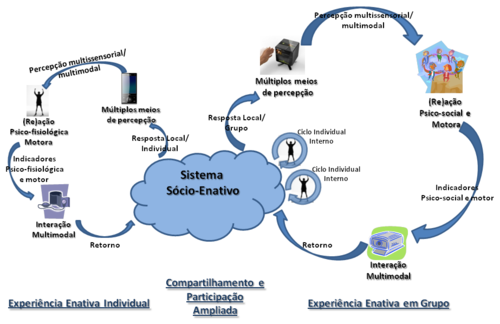Project Description
Socio-Enactive systems: Investigating New Dimensions in the Design of Interaction Mediated by Information and Communication Technologies (FAPESP Tematic Project 2015/16528-0)
Enactive systems have been defined as computer systems consisting of human and technological processes dynamically linked, i.e., forming feedback loops using sensors and data analysis, enabling a seamless interaction between human and computer.
The presence of new technologies and new forms of interaction (tangible, wearable and natural interfaces), coupled with the ubiquity of computing and social networks, present challenges that require the consideration of new factors (emotional, physical and cultural) in the design of systems we are naming socio-enactive. Such systems represent a complex scenario for which there is still no theoretical and methodological basis (and not practical experiences) suitable for its design.
The ways people will interact in socio-enactive environments is not easy to explain and to predict at design time. Consequently, the essence of how to develop systems of this nature requires the treatment of technological aspects in which the consideration of the social dynamic is enhanced by concepts such as Universal and Participatory Access, Affective Computing, Ubiquitous, Values and Pragmatics.
This project aims to build a conceptual framework from experimenting with different scenarios, to instrumentalize those involved with the design and development of such systems to produce technological solutions that effectively take into account the cultural context of those who participate, including their differences, needs, preferences, abilities and values. This framework will articulate the use of new tangible, wearable and natural interfaces technologies with the concept of pragmatic web for socially responsible design in different contexts. The knowledge produced by the project has the potential to influence how interactive systems are understood and designed.
Coordinator:
M. Cecília C. Baranauskas
Co-coordinators:
José Armando Valente
M. Teresa E. Mantoan


